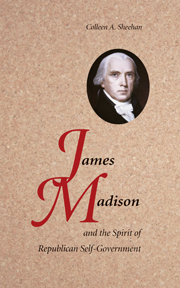Book contents
- Frontmatter
- Contents
- Acknowledgments
- List of Abbreviations for Sources
- Preface
- Introduction: Madison's Legacy
- 1 Republican Opposition
- 2 The Federalist Agenda
- 3 Madison and the French Enlightenment
- 4 The Commerce of Ideas
- 5 The Politics of Public Opinion
- 6 Madison and Jefferson: An Appeal to the People
- 7 The Spirit of Republican Government
- Epilogue: The Philosopher's Stone and the Poet's Reprise
- Bibliography
- Index
- References
2 - The Federalist Agenda
Published online by Cambridge University Press: 05 June 2012
- Frontmatter
- Contents
- Acknowledgments
- List of Abbreviations for Sources
- Preface
- Introduction: Madison's Legacy
- 1 Republican Opposition
- 2 The Federalist Agenda
- 3 Madison and the French Enlightenment
- 4 The Commerce of Ideas
- 5 The Politics of Public Opinion
- 6 Madison and Jefferson: An Appeal to the People
- 7 The Spirit of Republican Government
- Epilogue: The Philosopher's Stone and the Poet's Reprise
- Bibliography
- Index
- References
Summary
Madison's philosophic lead in opposing the “antirepublican” views and measures of the early 1790s defined the essential controversy between what would soon become the first American political parties. But history does not always favor the victors, and Madison's characterization of his opponents as antirepublicans did not stick. To almost a man, the Federalists considered themselves the true proponents of republicanism, much as the Antifederalists of the 1780s believed themselves to be the real Federalists. The character of Federalist Party thought remains unsettled in scholarship today, with myriad books that criticize the views of men such as John Adams and Alexander Hamilton (generally from a “Jeffersonian perspective”) and others that defend their republican credentials. Despite the widely read and influential essay by Daniel Rodgers, titled “Republicanism: The Career of a Concept,” which proclaims the end of “republicanism” as a paradigm for the American Founding, such interpretive claims will no doubt continue in the literature on this era. This is as it should be, for the term “republican” is not a later invention by scholars that has been superimposed on the eighteenth century. Rather, it is a term employed regularly by the Founders themselves to describe a form of government whose origins date to classical times. That the word meant different things to different people is not a reason to abandon its usage.
- Type
- Chapter
- Information
- Publisher: Cambridge University PressPrint publication year: 2009



